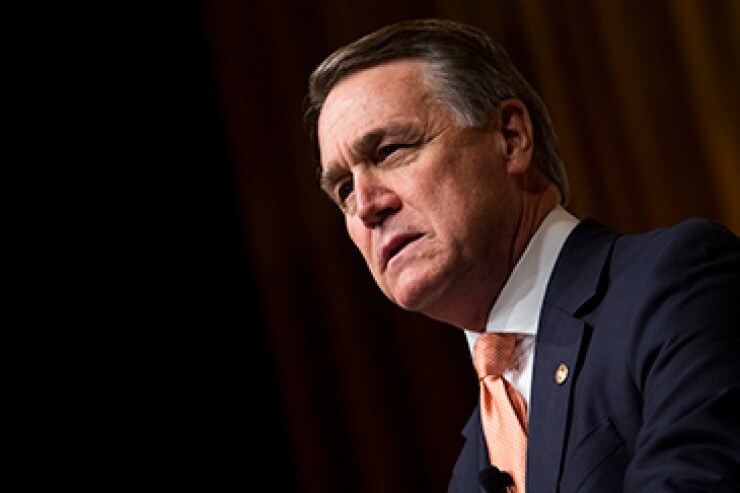
The Senate Banking Committee will have six fresh faces in the new Congress as Republicans grapple with a slimmer majority.
The panel roster was finalized Tuesday as Republicans announced committee assignments that included Sens. David Perdue, R-Ga., Thom Tillis, R-N.C., and John Kennedy, R-La.
Perdue and Tillis were elected in 2015 and Kennedy won in a runoff election in 2016 to fill the Senate seat vacated by Sen. David Vitter, a banking panel member in the previous Congress. Sen. Jerry Moran, R-Kan., is also off the committee and Sen. Mark Kirk, R-Ill., lost his 2016 re-election bid.
In a statement, Perdue said he will carry the GOP torch to reduce regulations on financial institutions.
"We need to dismantle the regulatory regime of Dodd-Frank, encourage entrepreneurial innovation, and unleash economic growth to get Americans working again," Perdue said.
Democrats, meanwhile, benefit from an additional seat on the panel. They now have 11 seats, compared with Republicans' 12, reflecting the closer division between political parties in the full chamber.
Overall, Democrats had three additional members as two left the committee. Joining the ranks are Sens. Brian Schatz, D-Hawaii, Chris Van Hollen, D-Md., and Catherine Cortez Masto, D-Nev. Sen. Charles Schumer, D-N.Y., will no longer be on the banking committee, instead focusing on his responsibilities as the Senate Democratic leader. Sen. Jeff Merkley, D-Ore., is also getting off the panel.
Progressives praised the Democratic assignments.
"Adding Schatz, Van Hollen, and Cortez Masto is a pretty clear win for folks who pushed Schumer in October to not stack Senate Banking with even more conservative Democrats," said Kurt Walters, campaign director at Rootstrikers.
But Washington observers said the dynamic at the committee will likely be similar to that of the previous Congress, with policymaking likely up to Sen. Mike Crapo, R-Idaho, who is chairing the committee, and Sen. Sherrod Brown, D-Ohio, the panel's top Democrat.
"Obviously it helps to have a bigger margin rather than a smaller margin, but for most purposes it doesn't really change much," said Mark Calabria, a former Senate Banking Committee staffer and director of financial regulations studies at the Cato Institute.
"The mix on the Dem side really hasn't shifted things much, in terms of progressive-moderate," Calabria said.
Likewise, Brian Gardner, a policy analyst at Keefe, Bruyette & Woods, said: "I don't see a big ideological shift among Republicans…The newer members will probably to some extent defer to the chairman and to the new administration."
However, there are high hopes for a better working relationship between Brown and Crapo. The committee may also be more active under Crapo.
"You have a big stylistic change with Crapo at the top replacing Shelby as chairman," Gardner said.
Of note is that Nevada will now have both its senators on the panel while New York — the financial center of the U.S. — will have none. Still, in his role as Senate Democratic leader, Schumer will carry significant weight, observers said.
"I suspect Schumer will be kind of a shadow member," Gardner said. "He may not be there to vote, but he is going to have a lot of behind-the-scenes say in what the Democrats' angle is to the committee. He is going to be active; he is just not going to be formally part of the committee."
But the Nevada senators could prove to be active in any debate over housing finance reform.
Nevada "was ground zero for the mortgage crisis," Gardner said. "They will be looking at mortgage issues obviously, but in a crisis mode it is more what the system should look like going forward."
Cortez Masto played an important role in the $25 billion national mortgage settlement as Nevada attorney general and later was able to settle a separate lawsuit with Bank of America, accusing the bank of breaking the terms of the original settlement.
Sometimes campaign contributions can also provide some insight into a lawmaker's policy positions.
Tillis counts the fund company Elliot Management as his top campaign donor, and the $1.6 billion-asset Live Oak Bank, which is based in his home state of North Carolina and is a large Small Business Administration lender, is his fifth-largest donor.




